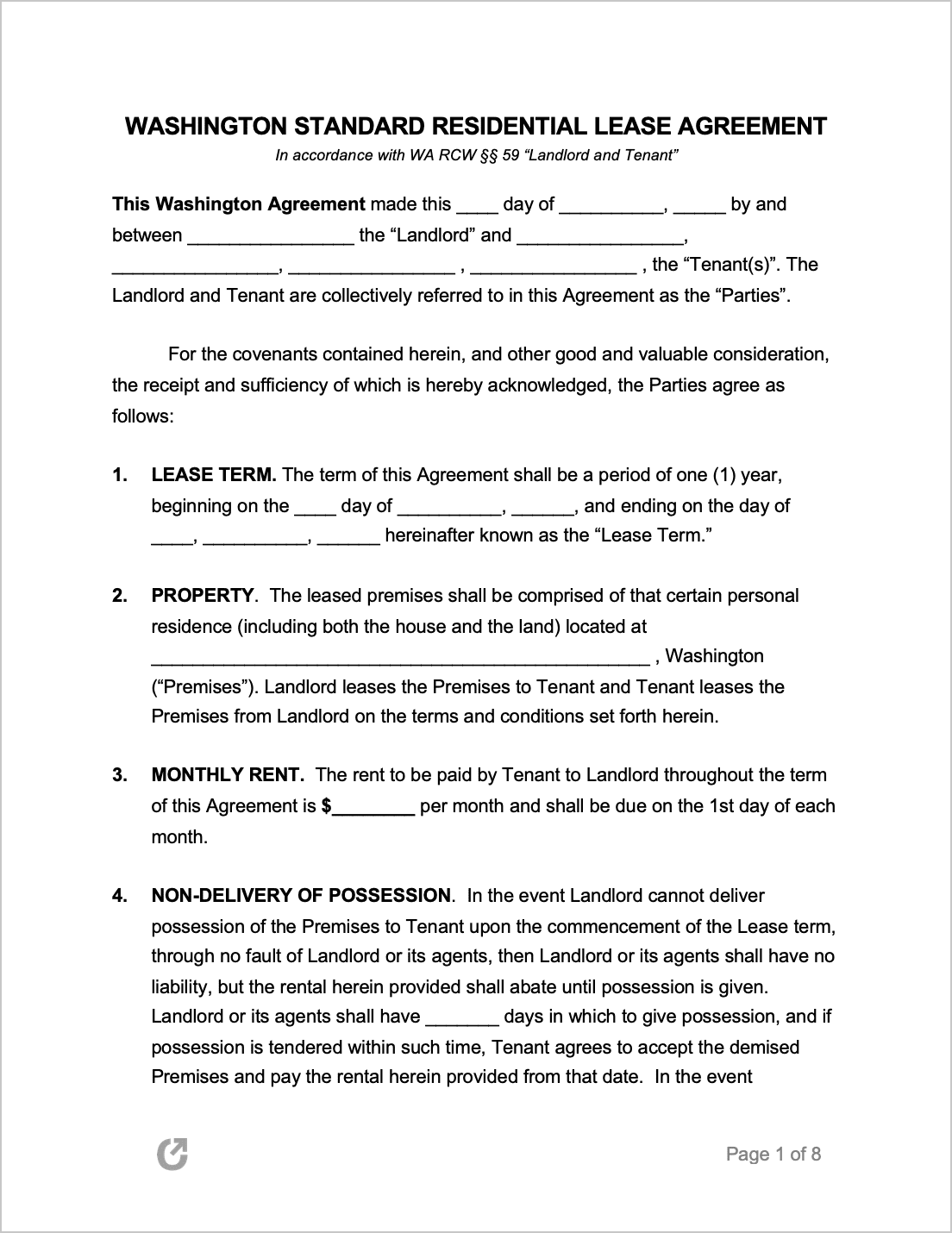Washington Rental Lease Agreement Templates (6)
The Washington Rental Lease Agreements are legally-binding contracts used by landlords for renting out property they own and/or manage. Lease agreements are one of the last steps landlords take in the rental process, coming after a landlord has successfully screened and approved of an applying tenant through the use of a rental application (below).
Washington lease statutes require landlords to make several disclosures to tenants through the lease, of which relate to lead paint, mold, fire protection, and nonrefundable fees, to name a few.
Types (6)
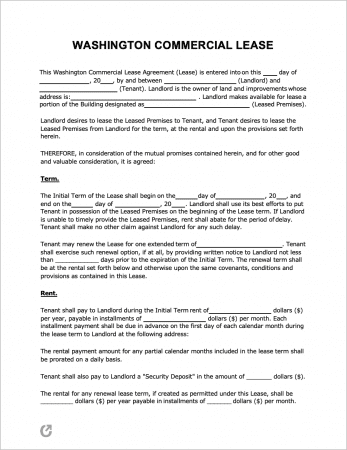 Commercial Lease Agreement – A contract that sets provisions for a landlord/owner to lease their property to a business.
Commercial Lease Agreement – A contract that sets provisions for a landlord/owner to lease their property to a business.
Download – Adobe PDF, Word (.docx)
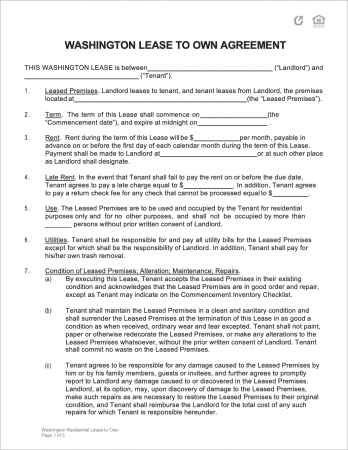 Lease to Own Agreement – In addition to structuring a lease, the document allows a homeowner to set a purchase price for their home. The tenant(s) can then optionally choose to execute the purchase price upon the lease’s expiration.
Lease to Own Agreement – In addition to structuring a lease, the document allows a homeowner to set a purchase price for their home. The tenant(s) can then optionally choose to execute the purchase price upon the lease’s expiration.
Download – Adobe PDF, Word (.docx)
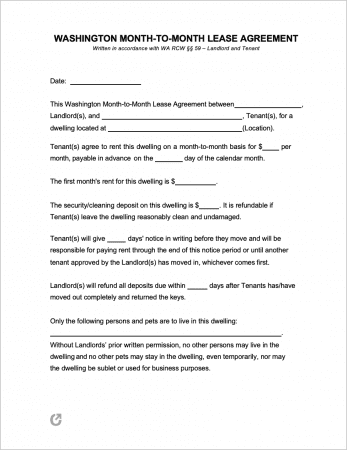 Month-to-Month Lease Agreement – A lease that renews every thirty (30) days. The lease-type is a popular option for landlords that can’t lease their property on a yearly basis.
Month-to-Month Lease Agreement – A lease that renews every thirty (30) days. The lease-type is a popular option for landlords that can’t lease their property on a yearly basis.
Download – Adobe PDF, Word (.docx)
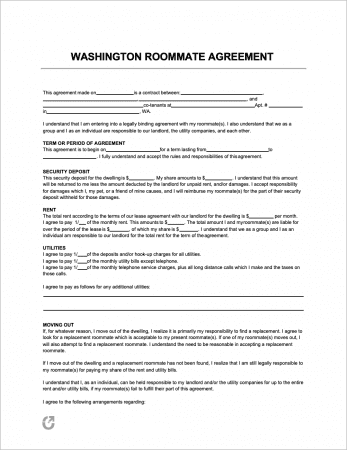 Roommate Agreement – Completed by tenants that share a single rented property for the purpose of avoiding conflict over day-to-day tasks.
Roommate Agreement – Completed by tenants that share a single rented property for the purpose of avoiding conflict over day-to-day tasks.
Download – Adobe PDF, Word (.docx)
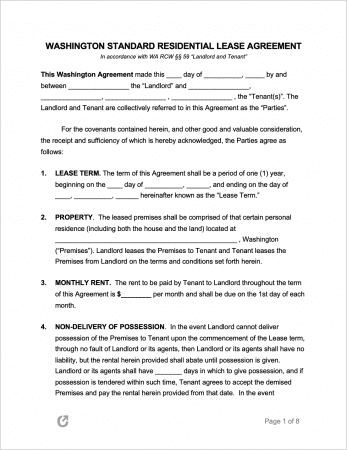 Standard Residential Lease Agreement – A lease contract used for setting up leases of one (1) year in length. Complies with all WA landlord-tenant statutes.
Standard Residential Lease Agreement – A lease contract used for setting up leases of one (1) year in length. Complies with all WA landlord-tenant statutes.
Download – Adobe PDF, Word (.docx)
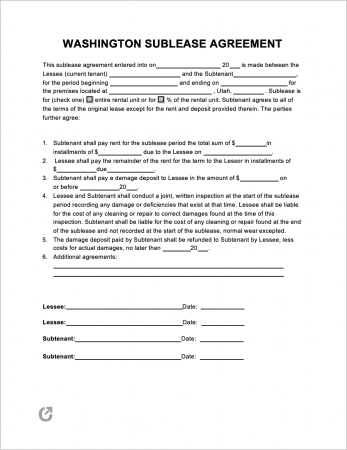 Sublease Agreement – Once completed, permits a tenant to vacate their rented property and have a new tenant (the “sublessee”) take on their rent payments in exchange for the right to live in the rental. Tenants should check their lease agreement to see if subleasing is permitted.
Sublease Agreement – Once completed, permits a tenant to vacate their rented property and have a new tenant (the “sublessee”) take on their rent payments in exchange for the right to live in the rental. Tenants should check their lease agreement to see if subleasing is permitted.
Download – Adobe PDF, Word (.docx)
What is a Washington Lease Agreement?
A Washington Lease Agreement is a form used for locking tenant(s) into an obligation to rent a property for a specified length of time (typically one (1) year). Given the importance of selecting an optimal tenant, landlords are strongly suggested to require tenants to complete a rental application prior to allowing them to sign a lease.
State Laws & Guides
Laws: Title 59 RCW – “Landlord and Tenant”
Landlord-Tenant Guides / Handbooks
- Washington Attorney General – Landlord-Tenant Law.pdf
- Your Rights as a Tenant in Washington State.pdf
When is Rent Due?
Washington law does not require rent to be paid on a certain date/time. Instead, the rental contract should clearly state how and when tenants should pay rent to the landlord to avoid misunderstandings. There is also no state statute on grace periods.
Landlord’s Access
Emergency (§ 59.18.150(5)): Landlords have the right to enter rented units in the event of an actual emergency.
Non-Emergency (§ 59.18.150(6)): Landlords have to provide tenants with at least two (1) days’ written notice prior to showing the unit to potential tenants, and two (2) days’ notice for all other purposes.
Required Disclosures
- Fire Protection & Evacuation (§ 59.18.060(12)(a)): Landlords must provide written notice to all tenants that contains fire safety and protection information relevant to the rental. The notice must include the fact that the rental dwelling is equipped with a smoke detection device, as is required by state law. The written notice must also disclose a number of specific matters, as outlined by § 59.18.060(12)(a), unless the rental is a single-family residence.
- Lead Paint Disclosure: In cases where a landlord of a rental property constructed before 1978 knows of any lead paint hazards in the property, it is their legal duty to inform tenants of these hazards. Landlords are also required to supply tenants with a copy of the pamphlet, Protect Your Family From Lead in Your Home.
- Mold Information (§ 59.18.060(13)): Landlords must provide tenants with information approved by the dept. of health regarding health hazards related to the exposure of indoor mold. The information must be in written format and either given to each tenant or posted in a public location at the rental property/premises.
- Name and Address (§ 59.18.060(15)): The landlord’s name and address must be included in a section in the rental agreement, or by a notice posted on the rental premises. If the landlord doesn’t live in Washington, they must provide the name and address of the person responsible for receiving notices and managing the rental.
- Nonrefundable Fees (§ 59.18.285): The rental contract must clearly state the fees (if any) that are nonrefundable.
- Security Deposit Information (§ 59.18.270): Landlords are required to deposit any security deposit received in a trust account. The landlord must provide the tenant(s) with a written receipt of the deposit that also contains the name and address of where the deposit is kept.
Security Deposits
Maximum – No limit.
Returning to Tenant (§ 59.18.280) – Washington law requires landlords to return security deposits within twenty-one (21) days after the termination of the lease (and the tenant’s moves out of the rental), or twenty-one (21) days after the landlord learns that the tenant(s) abandoned the rental unit.
Deposit Interest (§ 59.18.270): Per state law, landlords are “entitled to receipt of interest paid on such trust account deposits.”
